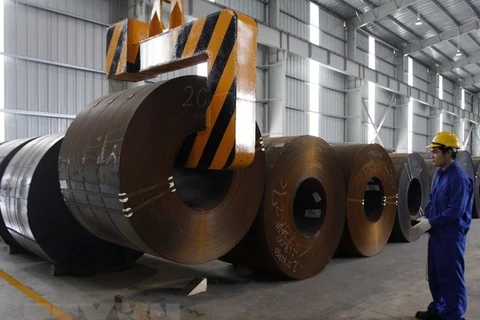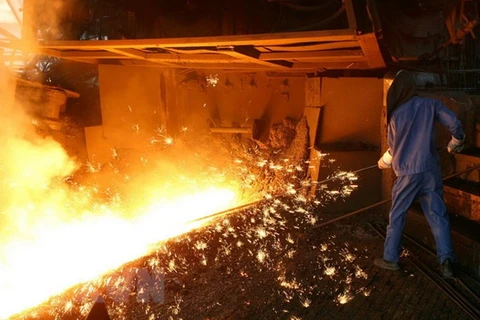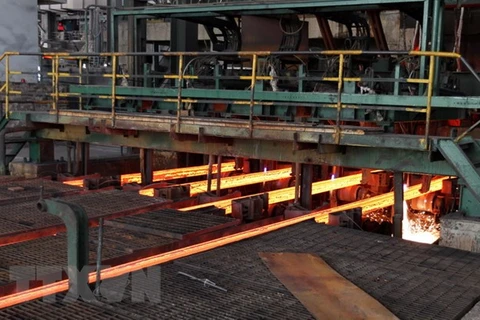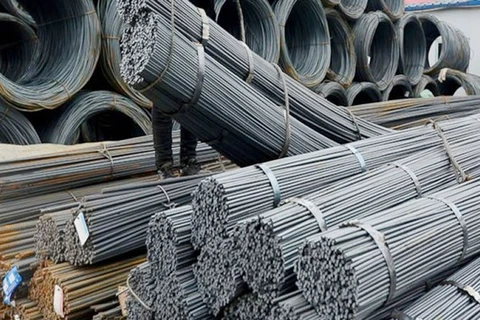Hanoi (VNA) – Vietnamese steel has faced nearly 10 trade remedy cases in just over a month, which has once again put the industry under great pressure from trade barriers in other countries.
The Vietnam Steel Association (VSA) said that within the last one month or so, the steel industry encountered eight trade remedy cases in seven markets. They include safeguard measures by the Thai Ministry of Commerce and the European Union, and anti-dumping investigations by the Canada Border Services Agency and the Malaysian Ministry of International Trade and Industry.
Meanwhile, the US Department of Commerce has launched two anti-circumvention probes into corrosion-resistant steel and cold-rolled steel imported from Vietnam.
The Eurasian Economic Union also started global safeguard measures for alloy and non-alloy steel. The Directorate General of Trade Remedies under the Indian Ministry of Commerce and Industry has also commenced a countervailing duty investigation into stainless steel pipes from Vietnam and China.
Iron and steel products top the list of Vietnamese exports suffering from trade remedies.
Director of the WTO and the Integration Centre at the Vietnam Chamber of Commerce and Industry Nguyen Thi Thu Trang said that by June 2018, Vietnam had faced 78 anti-dumping cases, 12 anti-subsidy and countervailing measures, and 17 anti-circumvention cases. Notably, steel products are involved in 37 of the anti-dumping cases and nearly three-quarters of the countervailing cases.
VSA Chairman Ho Nghia Dung said trade protectionism is increasing in the context of strong integration at present. Most trade remedies come from key markets of Vietnam like the ASEAN countries, the US and the EU.
These cases will greatly affect Vietnamese exports from not only now until the year’s end, but also over the years to follow. To sustain export growth, businesses and the VSA will have to exert their utmost efforts to seek new markets and deal with trade remedy cases, he noted.
Vietnam shipped abroad some 3.6 million tonnes of steel in 2016 and 4.7 million tonnes in 2017.
“Obviously, the rapid export growth has made other countries pay attention to Vietnamese steel and apply trade remedy measures to protect their domestic production,” Dung added.
A majority of Vietnamese steel is suspected of hailing from other countries like China and the Republic of Korea with circumventing duties imposed on products of these nations.
He said that in order to handle this problem, the steel sector has to perfect its production process and improve its competitiveness. In particular, they need to form a closed manufacturing cycle from input materials to production, gradually eliminating foreign factors to minimise the suspension that other countries’ products take advantage of Vietnam to circumvent duties.
Nguyen Thanh Trung, Chairman of the Board of Directors and General Director of the Ton Dong A Corporation, said that other countries’ protection measures are causing difficulties for the domestic steel industry. His company is upgrading technology as it will not only help protect the environment, but also it will ensure the quality of steel is maintained. This will help Vietnamese steel become more confident on foreign markets and reduce the application of trade remedies from other countries.
A representative of the Hoa Phat Group said that by building an iron and steel complex in Dung Quat Economic Zone in Quang Ngai province, the firm will become the second hot-rolled steel maker in Vietnam, as well as the only company owning a complete production chain from ore exploitation to steel distribution. It will help Hoa Phat promote competitiveness and minimise involvement in anti-circumvention and anti-dumping cases in export markets.
The Trade Remedies Authorities of Vietnam under the Ministry of Industry and Trade recommended that to cope with and avoid trade remedies, businesses should actively diversify its markets and avoid over-dependence on one single market. They also need to diversify products, boost product quality, reduce the competition tactic of cheap prices, and use more local materials. –VNA
VNA
























